Thursday, November 30, 2006
VERY LOW EMOTIONAL CAPACITY
"Hungry"? "Malnourished"? "Emaciated"? "Skeletal"? "Starving"? "Nearly dead"? These are just a few of the many “scientifically unquantifiable” terms that could be used to describe some of the 4.4 million US citizens now collectively categorized under the chilling phrase “Very low food security.” Leave it to a homeland bureaucracy of unfailingly salaried and well-fed officials to come up with words carved out of mental ice.
Wednesday, November 29, 2006
SAY IT AIN'T SO, DICK!
"But if you can breed cattle for milk yield, horses for running speed, and dogs for herding skill, why on Earth should it be impossible to breed humans for mathematical, musical or athletic ability? Objections such as 'these are not one-dimensional abilities' apply equally to cows, horses and dogs and never stopped anybody in practice.
"I wonder whether, some 60 years after Hitler's death, we might at least venture to ask what the moral difference is between breeding for musical ability and forcing a child to take music lessons. Or why it is acceptable to train fast runners and high jumpers but not to breed them. I can think of some answers, and they are good ones, which would probably end up persuading me. But hasn't the time come when we should stop being frightened even to put the question?"
It's not impossible; Hitler tried it, no doubt others are trying it even now; and to some extent it has always been done through arranged marriages, sectarian marriages and the like; but even then, as historically and incestuously among animals, precision was left to fate and defectives were rife.
But now that precision is coming more and more into our own hands, that is where the problem lies: who will decide? Who can be trusted with forever? Who has not only the technical knowledge and the moral integrity, but also the transcendental perspective?
And how crass would it be to purposely 'breed' a child who was a prodigious talent? What personal pride and integrity would that individual enjoy, when everyone knew their talent was 'artificial'? Here you are toying with things beyond science, where dangers reach far beyond grotesquerie...
Nature will always know more than we can know, and will always do more than we can comprehend; no matter the narcissistic pride we take in our new technologies, our tamperings will always be crude and darkling, relative to all the light. In this regard I'm reminded of the opinion of the native American when asked about the quality of the new salmon his people had been catching, that had been scientifically restored at last to the northwest rivers through artificial insemination and release as fingerlings. The new salmon were small, stupid and less tasty. This was because, as a species, they had been deprived of natural selection, comprehensive ecochallenge and unbroken species experience. Science can never replace these elements, for they are not replicate in the DNA. Imagine the equivalent picture for humans, a picture we have only begun to see...
But when has imagination ever stopped science?
Tuesday, November 28, 2006
ON THE BLOG BROTHERS
After our long hiatus, Mick has just posted Instant Karma Nearly Got Me, a look into the latter 1960s et seq. on The Blog Brothers, to be continued.
Monday, November 27, 2006
ANOTHER TASTELESS COMMERCIAL VENTURE
 For some reason I cannot fully understand - maybe because I don't actually live in the country - this cruel countdown calendar is a runaway best seller all over America, where citizens of every stripe are climbing over one another, clamoring and clawing for even just one copy of this tasteless commercial venture to hang prominently on home or office wall and cross off each and every day like a stitch in an open wound until the end of a singular era, however grotesque they may believe that era to be, in a sickening display of gross and flagrant disrespect for the highest office in the land! Surely, as members of a representative democracy we have been taught to respect our duly elected officials, however alleged, and no matter the extent to which they are said to have sullied their office? They represent us, one and all! What is civic responsibility coming to? Anywhere I can get one of these in Japan?
For some reason I cannot fully understand - maybe because I don't actually live in the country - this cruel countdown calendar is a runaway best seller all over America, where citizens of every stripe are climbing over one another, clamoring and clawing for even just one copy of this tasteless commercial venture to hang prominently on home or office wall and cross off each and every day like a stitch in an open wound until the end of a singular era, however grotesque they may believe that era to be, in a sickening display of gross and flagrant disrespect for the highest office in the land! Surely, as members of a representative democracy we have been taught to respect our duly elected officials, however alleged, and no matter the extent to which they are said to have sullied their office? They represent us, one and all! What is civic responsibility coming to? Anywhere I can get one of these in Japan?
Sunday, November 26, 2006
HAVING THE DEVIL'S TONGUE
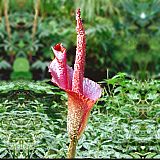 Life can sure be bizarrely interesting all of a sudden smack in the middle of your own existence, as it was for me on a recent evening.
Life can sure be bizarrely interesting all of a sudden smack in the middle of your own existence, as it was for me on a recent evening.Echo had just gotten home and I had arrived from work earlier than usual, so she was in the midst of cooking a quick dinner of okonomiyaki, at which I sat down to begin eating while she cooked the last of them (it's like making pancakes at home, you cook them all in one go).
I was hungry and the food was very tasty, a perfect pre-winter evening quick meal, so in the gusto of my savory enthusiasm it took me a while to pay much attention to an increasingly gnawing reality, i. e., my tongue and its general environs, including me generally.
At first I thought that that wonderful organ was just reacting a bit sensitively for some reason (e. g., I'd had some excellent but strong cherry gumdrops a few hours earlier), and that it would settle down, as tongues do. This was a minor level of discomfort in any case, and the okonomiyaki was delicious, so I persisted, thinking that the discomfort would either remain at this acceptable level or taper off. But it didn't: it got worse. I went and looked in the mirror to see if I had what felt like an accelerating number of microcanker sores, or maybe a thousand nanoswords sticking out of my tongue. Nope: normal-looking tongue, no cankers, no swords, no nothing.
Nevertheless I went back and continued eating because hunger has little intelligence. I was famished, the okonomiyaki was delicious and my tongue would anyway do its own thing as it always has, I thought, conflating this instance with those occasions in my past when I'd had a sore mouth/tongue for one reason or another.
Soon, though, it became impossible for me to continue eating. I'd consumed about ¾ of the okonomiyaki when I had to sit back in my chair with my mouth open and breathe cool air that did not extinguish the flame that now was my tongue or the new furnace that was burgeoning in my mouth and throat. I would wait it out, I thought, this personal idiosyncracy, then finish my meal. Few are as stubborn as a hungry Irishman.
Echo sat down to eat. In just a few bites, she said: "Something's strange... what did I put..." She dashed to the fridge and took out the dark jinenjo variety of yamaimo (Dioscorea japonica) root she'd grated into the okonomiyaki, opened the paper wrapped around it (on which there was some rather serious-looking writing) and said "Arrraaaaaa!" (The Japanese equivalent of "OOHHMMYYGGOODD!") "This isn't jinenjo!!"
I stared at her, mouth already conveniently agape, awaiting the details of my imminent death. "This is konnyaku root!" Konnyaku root, you see, from the plant we in the West ominously call Devil's Tongue (Amorphophallus konjac or rivieri), is supposed to be grated, boiled all to hell in order to COMPLETELY REMOVE THE EXTREMELY HIGH CONCENTRATION OF OXALIC ACID THEREIN, then mashed and mixed with limestone to coagulate the result, which is then formed into a substance that is carefully parboiled before being finally served as konnyaku, a neutral-tasting, rubbery food item I'd never really cared for all that much during my brief but interesting life.
In my remaining moments I hastened to the computer to google oxalic acid and found, as viewed through now upper-case eyeballs: "CAN BE FATAL IF SWALLOWED... DO NOT INDUCE VOMITING..." Oxalic acid does its damage by absorbing large amounts of calcium from the blood... can cause kidney and digestive tract damage... can be fatal... but only in large quantities of the raw chemical... My mind was still clear, since on my behalf it quickly calculated that I had swallowed only a relatively small amount from a modicum of root in a large amount of okonomiyaki batter, only a single portion of which I had not even finished eating.
So I was now a living experiment. I ate some yogurt and honey. I drank some of a special concentrated calcium drink we have. I took some calcium tablets. The tongue, mouth and throat pain didn't keep me from sleeping as deeply as if it were my last sleep. The thousand nanoswords had waned to a few tinglefeathers by the next day. The day after that I had a remotely dull ache in my right kidney for a couple hours.

Folks commonly say the plant is called Devil's Tongue because the flower perhaps looks maybe like a devil's tongue might possibly look if there were an actual devil's tongue around to compare it with, but they only believe that because they've never eaten the raw root, which puts the devil's tongue right in your own mouth.
These few days later, now that the devil's tongue has departed my mouth and I've got my own tongue back (a different set of problems), I can't swear any more effectively than I did before, but some things have changed as a result of my satanic experience. For example, the rest of my life looks richer now that I haven't died. And we no longer cook in haste.
Also, I have inexplicable sudden cravings for fresh konnyaku...
Friday, November 24, 2006
Thursday, November 23, 2006
We, the Undersigned, endorse the following petition:
End Dolphin Slaughter in Japan
Target: Shinzo Abe, Prime Minister, Government of Japan
Sponsor: The Ocean Project
Sponsor: The Ocean Project
Wednesday, November 22, 2006
THE PROMISE OF THE ROAD
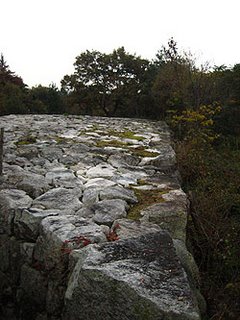 Today before our walk we went to buy our eggs at our egg-buying place, a farm up in the foothills north of here where they give the chickens fresh well water and natural food and the shells are strong, the yolks are golden, the eggs are reasonably priced and the chickens are so happy they laugh all day. They only stop laughing to lay eggs.
Today before our walk we went to buy our eggs at our egg-buying place, a farm up in the foothills north of here where they give the chickens fresh well water and natural food and the shells are strong, the yolks are golden, the eggs are reasonably priced and the chickens are so happy they laugh all day. They only stop laughing to lay eggs.While we were there (the monkeys had just been through and the persimmons were lying in bright orange chunks all over the ground, I'm not the only one who has monkey trouble) we decided to take our walk up toward the mountains along the tree-tunneled road golden and red with the glow of the leaves from the sun shining through. We had never walked that road before, and new roads are the stuff of promises.
We saw some pretty fancy but unattended old graves way in the woods as we went up the road, and no houses anywhere along it, just forest. After a time, as it began to get cloudy we came to a long - and in places high - stone wall on the left, with nothing visible atop it, just the sound of water. I climbed to the top and saw a vast pavement of stones, large stones, some of them as large as a car, an arrangement of stones unlike anything I had ever seen before, just a long platform expanse of stones laid out in no particular design, right in the middle of the forest. It wasn't a foundation, but had been carefully made, the naturally shaped stones arranged to fit together but not tightly, and without cement, so it was old, but it was clearly not an aesthetic endeavor, so what was it?
There was a waterfall off in the forest beyond, and a small manmade self-contained pond just above it, that was clearly now used to collect and direct water for use lower down, but that had nothing to do with the stone structure. Out in the middle of the stony expanse was a wooden sign, painted in the old style, with a writing brush in sumi ink. We walked out to it.
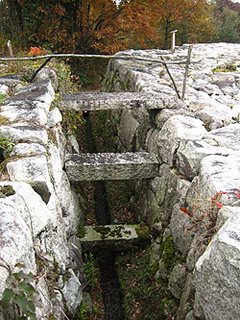 The sign said (rough translation) that this arrangement of stones had been built in 1852 after an unusually long and heavy rain had caused a landslide from the mountain above us, that had killed many in the village below. (It was a landslide dam!) To build this wall , thousands of local people worked for 5 years and 8 months. Male workers received 10 cups of rice per day, female workers received 5 cups of rice per day.
The sign said (rough translation) that this arrangement of stones had been built in 1852 after an unusually long and heavy rain had caused a landslide from the mountain above us, that had killed many in the village below. (It was a landslide dam!) To build this wall , thousands of local people worked for 5 years and 8 months. Male workers received 10 cups of rice per day, female workers received 5 cups of rice per day.And there it stood, just as it had been built using nothing but human and animal power in the middle of otherwise nowhere, a sort of historic edifice to tragedy, collective endeavor and sexual inequality on an untraveled byway, no signs pointing to the structure, you just have to find it by chance like we did, and there hasn't been a single landslide since they built it, over 150 years ago. So in a way, it really worked.
And that road sure kept its promise.
Monday, November 20, 2006
Sunday, November 19, 2006
VERY USEFUL SOIL GUIDE
The Willamette Valley Soil Quality Guide was designed with farmers in mind, but can be used by gardeners in most zones across the country. "The general principles of the test are applicable anywhere, but the specifics will differ."
from Organic Gardening
Saturday, November 18, 2006
WARBLER IN THE HEAVENLY BAMBOO
 As I split some oak on a calm, clear afternoon with winter chilling closer each day, a warbler watches from behind the bright red berries of the heavenly bamboo. He is at this altitude for the brief time that the lowering temperatures are just right, and will follow the temperature to the lowlands.
As I split some oak on a calm, clear afternoon with winter chilling closer each day, a warbler watches from behind the bright red berries of the heavenly bamboo. He is at this altitude for the brief time that the lowering temperatures are just right, and will follow the temperature to the lowlands.Bouncing this way and that, he turns his tiny head in every direction he can with his eye on me, the better to gain some varied perspective on the bizarre behavior exhibited by this other two-legged creature and the mystery he represents to birdhood.
As I work my axe and maul and wedges, lifting and splitting pieces of trees, I wonder what warbly thoughts there might be in that bright feathered head about what I'm doing-- perhaps he is puzzled by my lack of wings or my knees that oddly bend forward, or maybe my pitiful attempts at warblerlike whistling, that falls so far short of the silky glissandos of his own glorious songs— perhaps my featherless need for firewood intrigues him, or my constant manipulation of tools, to the great detriment of bug and berry harvesting— why not just move to more hospitable places, eating as I go, as he does—
Enough pondering the imponderable-- he flies off, a wisp of me flies with him...
Friday, November 17, 2006
JAPAN CONTINUES KILLING ENDANGERED WHALES
They say its for 'research,' for example into such subjects as how much political support can be obtained from the remnant whaling industry, but their killing of whales in order to save them (where have I heard that before?) includes fin whales, which the World Conservation Union has included on its list of endangered species. To say nothing of 850 11-meter Minke whales, which like all other creatures on earth are here for deeper reasons than we can ever scientize.
Surprisingly, this predation has been criticized by the US, whose current administration has been about as eco-conscious as a cluster bomb (btw, the annual buffalo-slaughter-to-save-the-cattle began November 15).
We don't have to kill to live.
Thursday, November 16, 2006
SUPERIOR GUIDE TO HONING AND SHARPENING
 From razors, axes and knives to handscythes, chisels, planes and chainsaws, if you can't sharpen your tools, they ain't worth much.
From razors, axes and knives to handscythes, chisels, planes and chainsaws, if you can't sharpen your tools, they ain't worth much.All at the excellent Museum of Woodworking Tools.
They sell quality tools, too, including Japanese tools.
via Metafilter
They sell quality tools, too, including Japanese tools.
via Metafilter
IT'S NOT ONLY YOU WHO ARE WHAT YOU EAT...
Research at the Children's Hospital Oakland Research Institute shows that a mother's diet during pregnancy not only affects her child, but also the child's future offspring.
"This message is urgent. If we do not make significant efforts to boost the nutrition and dietary habits of young couples who are about to conceive a child, we are creating a multi-generational health burden that will impact individuals, families and entire nations for a hundred years or more."
Wednesday, November 15, 2006
ADVICE FOR 20-YEAR-OLDS
If you are as 20 years of age as I once was and may for example one day be an elder American male traveler of widely mixed ancestrage who has achieved 66 years of age in a foreign country where you are inaccurately rumored to be a reclusive hermit, how is all this dispelled? It is dispelled in the far best way by the visit of a granddaughter named Kaya, soon to be 6 years old, of whose birth you have been a part, who visits you now, rocketing from the car with a smile even wider than you hoped for, arms open, anticipating an embrace that you are after all this life worthy of, all you now 20-year-old travelers. Look forward with all that you have, for all that will one day look forward to you.
LIVING TO A GRAND ELDERNESS
"Many Japanese are living to a ripe old age, and more than 20,000 of them are over 100 years old.
Life expectancy in Japan, for both men and women, is the highest in the world. What are some of the conditions that made this possible?"
Life expectancy in Japan, for both men and women, is the highest in the world. What are some of the conditions that made this possible?"
Wise words on aging from Hinohara Shigeaki, a practicing M.D. 92 years of age.
Tuesday, November 14, 2006
A SUDDEN TWINSTORM
Got a phone call the other evening that that affected our slow and calm and measured pre-winter preparations a little bit like that meteor affected the dinosaurs. As it happened, our son-in-law's grandmother (whom we've never met) had suddenly passed away at the age of 96; the wake was to be held on Monday and the funeral on Tuesday in Otsu, the city at the south end of the lake.
Since Kasumi, Tatsuya and family would be coming, and the boisterous, yakky 3-year-old twins could not comfortably be taken to a somber wake by any stretch of anybody's imagination, they were to be placed in our charge for a whole afternoon and evening on Monday which, since Monday is Echo's day teaching yoga in Kyoto, meant my charge, right out of the blue like that. Not that I sought one, but there was no escape.
When the young family got here yesterday, Kaya was asleep in the front seat (being old enough, she would be going to the wake, in her new school uniform) and the twins were just two cute little blobs of doze in the back; but when they were unloaded into the house they firmed up, regained their normal dimensions and slowly looked around, realized where they were and took over as Kasumi said goodbye and drove off, leaving me alone in a house on a mountainside with two speedy embodiments of hunger, thirst and curiosity.
They wanted to know what everything was that had not been here before, what could be eaten and what could be drunk, item by item, for example that red-topped jar with what looks like very tasty walnuts in it, and these interesting multicolored tea bag packets is the woodstove hot, what's that up there can I climb this I want to watch a video I like these chairs we can't open the bathroom door I'm going upstairs and look around can I open this box what happens if I put this on my head
I made the mistake of trying to distract them from the world at large and get them into seats by offering them some fresh persimmons and a cup of blueberry tea that disappeared in Guinness Book time, after which I have never seen anyone want to go to the bathroom so often. They do have tiny bladders, but every 20 minutes? (With twins, that's every 10 minutes.) It was a clock-racing relay marathon.
One of them has acquired a strong fondness for running, so I played the starter pistol while she ran back and forth across the long living room a few dozen times, with bathroom breaks. The other one, who had a bit of a cold, just walked. With bathroom breaks. I still can't tell quickly and confidently which one is Miasa and which is Mitsuki, so for example when one of them was doing something suspicious while I was going to open the bathroom door for the other, I tried the overall shorthand of just saying “Mi-chan! Don't do that!” ("-chan" is the diminutive) And they'd both look at me with that touch of puzzlement they frequently use in my presence.
I've mentioned before that the twins have their own language. Every once in a while one of them would sidle up to me, clearly after some kind of indulgence, and say in that tiny indulgineering voice, something like "bion papete..." I'd say What? "bion papete..." I'd say What does that mean? And so it would go back and forth in more and more of their words, the other twin slowly drifting over, when we'd get into a Joycean-Wonderland conversation about I couldn't imagine what; they couldn't see why I couldn't understand - I seemed in other matters to be sufficiently intelligent for their requirements - until for example they'd lead me by the hands to some sunflower seeds they'd found deep in a cupboard and wanted to relate to as locusts relate to regions of Africa.
Fortunately I'd been firewooding for a couple of hours when the dauntless duo arrived, so I was full of energy too and could handle it all, plus the lifting and carrying involved. Nothing like working with oak to prepare you for a visit from the twins.
Monday, November 13, 2006
NIGHT BAMBOO 1
Standing out in the strong wind last night getting a good soft buffeting, listening to the air itself roar the way it does when seasons change, in the castoff light from the house windows I watched the same bamboo I always see as a wall of vegetation in the light of day when I look out the window or glance up from gardening or firewooding-- but now in the light upon the dark and as a figure in the picture myself I saw the bamboo as if on a stage, saw how it lived and moved in ancient understanding of the roar of an autumn night, it was a different beast, clearly alive now, collective in its singularity, truer to its nature there in the night world, where seeing is of no point and being is all--
I'd always thought of the bamboo in itself as individual stalks; this is the variety they make fishing rods out of, mountain bamboo, grows taller than a man but is slender and crowded, too densely for any but wild pigs, ferrets and snakes to get comfortably through, maybe a fox now and then (the bamboo and the animals share a primordial alliance of noses and shapes) but now in the hurry of the night each light-paled stalk was on its own, yet one with all the others, like a school of bright fish in the sea they were together, shifting and swerving, shining and turning as one golden mass in the roiling ocean of the air, that ocean moving with and around them, 'together' in its deepest meaning, wind and stalk, air and plant in one vast thought swaying, vibrating; both surrendering, both prevailing, the air moving on, the bamboo letting it go, holding fast to the earth, each stalk reaching even in the night for the light of the day to come, in ancient and undying trust.
Sunday, November 12, 2006
ALL TOO HUMAN
My initial reaction to the news was delight in the exposure of a dogmatically righteous hypocrite; then I read my brother's insightful take on the fall of Ted Haggard.
Saturday, November 11, 2006
Friday, November 10, 2006
I KNEW IT!
As faithful readers of these meandering accounts are well aware, I have an ongoing problematic interspecial relationship with the local Macaca fuscata ("Japanese monkeys," as most folks call them - or "snow monkeys" - I call them hairy marauders, onion pirates, pumpkin purloiners, tomato
 pilferers, the list is long), who keep acting as though this entire mountainside and everything on it, except maybe my firewood (until they find out its value), belongs to them. Hard to believe that in some places in the world - as with the Trojans and their gift horse - people are trying to give these ruthless brigands fundamental human rights!
pilferers, the list is long), who keep acting as though this entire mountainside and everything on it, except maybe my firewood (until they find out its value), belongs to them. Hard to believe that in some places in the world - as with the Trojans and their gift horse - people are trying to give these ruthless brigands fundamental human rights!As a result of these increasingly adept behind-the-scenes maneuverings and strategic psychomanipulations on the part of the shifty simians, particularly the way they are beginning to use their "cuteness" and "humanness" to direct society at large - which I must point out has no onion patches high on forested mountainsides - it has become clear, as previously and frequently intimated herein, that the red-faced beasts are extremely crafty-- even extremelier than I thought.
As it turns out, their implicit (though carefully concealed from human eyes) use of timing devices, calculators, organizers and maps (and who knows what else they have up there in the forest) is only touching the surface. I have often mused about how soon the suitless simians would be wearing ties and commuting with the rest of us, taking away our jobs, entering government etc. Little did I know how close my musings were to imminent reality-- that there is in fact a simian plot afoot to take over not only my mountainside, but the entire world!
Naked apes beware.
Thursday, November 09, 2006
HOW SWEET IT IS
How sweet it is, on an autumn day as clear as a baby's eyes, to be out there working with oak logs in the cool of the afternoon, following like a hungry scholar the noble nature of this wood that is the very heft and fragrance of integrity, savoring the sound like tiny crackling flames when at last the sections split into two, four, eight and then the music of oak when the splits are stacked like ingots of cloudy gold, how rich they look, how rich I feel, how warmly they tell of future comfort, tomorrows given to other pleasures, and at sunset the wealth of aching muscles that have served to surround me with gold, then to come indoors and find that on the other side of the world the Dems have taken the House and likely the Senate, that America is still the government of the people, insisting on a Democracy with an honest voice for all! A day immersed in integrity: how sweet it is!
Wednesday, November 08, 2006
HERE COMES THE SUSHI SQUAD
 Like the French with their Bordeaux and the Italians with their Parmesan, the Japanese are getting proprietary about Japanese cuisine. And rightly so, I say. There are no standards outside of Japan; restaurateurs in other countries can call anything Japanese, and do, for a premium price.
Like the French with their Bordeaux and the Italians with their Parmesan, the Japanese are getting proprietary about Japanese cuisine. And rightly so, I say. There are no standards outside of Japan; restaurateurs in other countries can call anything Japanese, and do, for a premium price.I remember when the kids were little, on one of our trips to the US they wanted to have some Japanese food, so we went into a Japanese restaurant in Brooklyn Heights where we ordered the tempura and were served our bowls of misoshiru with a spoon(!). We sat there staring at the soup and at each other, waiting for the rest of the meal (the misoshiru is eaten together with the meal in Japan), until the American part of my brain noticed that the waiter was standing at a discreet distance waiting for us to 'finish the soup,' which in the West is the first course.
So we finished the misoshiru solo, which was odd to me, but completely bizarre to the kids. Then the tempura came, in a huge four-compartment lacquered box of American portion size, with giant, heavily over-fried tempura in one corner, non-sticky rice(!) in the opposite corner and vinaigrette salad in the other two corners! The kids and I looked at each other in amazement: salad with tempura?? We ate as much as we could of this odd meal, all part of the learning curve, but I avoided Japanese dining in the US for years after that, until Keech and I took my brother and his wife to a 'Japanese' restaurant in Palm Springs.
So at last, the Japanese have taken heed of this widening unscrupled tide of soggy makizushi, too-thick sashimi, excess wasabi, zarusoba on a plate and non-sticky rice: Japan's Agriculture Ministry will now certify authentic Japanese restaurants in foreign countries so as not to have their "brand" diluted, and so that folks in foreign lands can be assured that they're actually eating the Japanese-style food they're paying for. Which is the way it should be, since the real thing is exquisite and worth the price.
However, as a long-term resident in Japan and inveterate seeker here of such renowned foreign cuisine as genuine New York pizza, an authentic range of ice cream flavors and true American pies, I ask: Where, then, are the Pizza Police? I see no Ice Cream Commandos! Whence shall come the Pie Enforcers?
Cuisinal justice wields a two-edged sword.
Tuesday, November 07, 2006
WHAT IS THIS WORLD COMING TO?
"It should surprise few readers that we think a vote that is seen—in America and the world at large—as a decisive 'No' vote on the Bush presidency is the best outcome."
"Meanwhile, America's image in the world, its capacity to persuade others that its interests are common interests, is lower than it has been in memory."
"There may be little Americans can do to atone for this presidency, which will stain our country's reputation for a long time. But the process of recovering our good name must begin somewhere, and the logical place is in the voting booth this Nov. 7."
Excerpts from The GOP Must Go
in The American Conservative(!!)
in The American Conservative(!!)
Monday, November 06, 2006
WAITING FOR THE FULL MOON
Today the long brown road led to village shops and walnut cakes, yakimono galleries, mailing a package to mother- and father-in-law way up north in Shinshu (old name for Nagano), then on to other mountainsides, egg farm, forests, acorns, persimmons, gathering firestarter pinecones on the pine beach beside the big blue lake with little white sailboats beneath a big blue sky with little white clouds, a farmer in the distance walking slowly along the road behind his tiller, nodding at his neighbors as he goes, farm market vegetables, turnips, long white radishes, spinach, ginger, onions, gourds and the smiling faces that grew them, sliced funazushi laid out like pisces atop fresh rice, a new house behind the old fence up the road, straight the rows in the fallow fields, armfuls of kindling satisfactorily stacked by the door to the stove, crows calling in the autumn haze, sips of the taste of Merlot-- all wrapped in the slow cooling turning together into fall; tomorrow, logs to buck and split for next winter...
Sunday, November 05, 2006
WENT OUT POOR
Went out late last night for a clear-sky, full-moon walk up and across the mountainside where the view feeds the reaches of the eye, with the mountainside cast in silver all around us, like the lake at our feet, that beneath the rising moon was silver washed at first in flames of rose, then golden amber and finally, as the moon came into her own on high, trailing veils of light, the lake was lit with sparkles as from a giant bowl of yellow diamonds. Came home rich.
Saturday, November 04, 2006
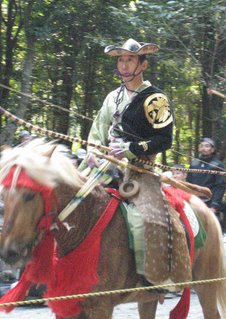
YABUSAME
Yesterday, which was Culture Day, a holiday, we joined the crowds at Omi-jingu in Otsu to watch the yabusame (horseback archery) event, which is always a close-up thrill. Perfect day for it, too. With three shots per run and about 40-50 yards between targets for letting go of the reins, then grabbing, notching, aiming and shooting each arrow from the back of a galloping horse, one of the archers hit all three of the smallest bulls-eyes on one run! The crowd went wild!

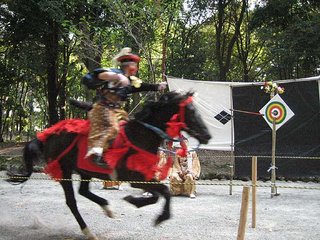
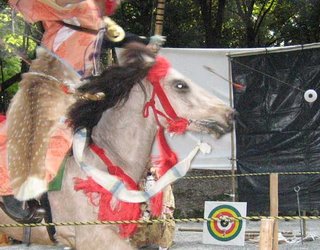
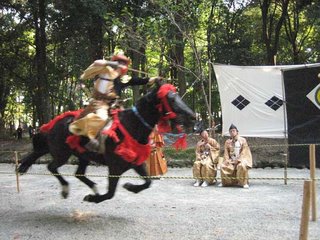

If you want to become a yabusame ite (archer), enroll here...
Thursday, November 02, 2006
MORE BOAR LORE
 Wild boars have been getting some bad press around the world recently, in stories ranging from organic spinach farm contamination, to raiding gardens and attacking humans. Inoshishi (wild pigs) are part of the lore around here, too; I haven't heard of anyone being attacked, but they do raid gardens and rice paddies.
Wild boars have been getting some bad press around the world recently, in stories ranging from organic spinach farm contamination, to raiding gardens and attacking humans. Inoshishi (wild pigs) are part of the lore around here, too; I haven't heard of anyone being attacked, but they do raid gardens and rice paddies.However, inoshishi are a popular food out here in the countryside, where restaurants feature inoshishi-centered meals, so maybe things balance out more in Japan than elsewhere... Still, every time we go for a walk around here on old mountain roadways through the woods, we come across places where the inoshishi have been freshly nosing up the shallow mosses to find worms, bugs and grubs, and occasionally we see a pertly bouncing tail in the forested distance as an inoshishi trots briskly away, well warned of our approach.
Oddly, however, I have never seen inoshishi in my garden, or found signs of them rooting up any of my vegetables. I guess the monkeys have those rights around here.
But things may change next year, which will be The Year of the Boar...
Wednesday, November 01, 2006
BLACK IRISHMAN
 When I lived in Spain back in the 70s I was amazed to see, every now and then, someone who looked very much like me or a relative of mine. I was told there that, as one of the so-called "Black Irish" (black hair, blue eyes, pale skin) I was probably a descendant of one of the survivors of the Spanish Armada, many ships of which had been wrecked upon the shores of Ireland.
When I lived in Spain back in the 70s I was amazed to see, every now and then, someone who looked very much like me or a relative of mine. I was told there that, as one of the so-called "Black Irish" (black hair, blue eyes, pale skin) I was probably a descendant of one of the survivors of the Spanish Armada, many ships of which had been wrecked upon the shores of Ireland.Decades later in Japan, via the internet I found out it was more likely that Celtic ancestors from the Iberian Peninsula had, many millennia earlier, settled in what later became Ireland, and that the few Spaniards who had managed to survive the wreckage of the Armada and make it to shore in Ireland had been stripped and slaughtered right there on the beach or were later caught by the English or their allies and executed. Very few escaped alive, and likely none remained in Ireland.
In that connection, via the rootsweb.com ny-irish mailing list, I came upon this astonishing first-hand tale of that very event:
Captain Cuellar's Adventures in Connacht and Ulster (Author: Francisco de Cuellar)
Francisco de Cuellar was aboard the last group of Armada ships wrecked in Ireland, on 25 September 1588.
As a sample, his description of the Irish he encountered in the region of the MacClancy clan:
"The custom of these savages is to live as the brute beasts among the mountains, which are very rugged in that part of Ireland where we lost ourselves. They live in huts made of straw. The men are all large bodied, and of handsome features and limbs; and as active as the roe-deer. They do not eat oftener than once a day, and this is at night; and that which they usually eat is butter with oaten bread. They drink sour milk, for they have no other drink; they don't drink water, although it is the best in the world. On feast days they eat some flesh half-cooked, without bread or salt, as that is their custom. They clothe themselves, according to their habit, with tight trousers and short loose coats of very coarse goat's hair. They cover themselves with blankets, and wear their hair down to their eyes. They are great walkers, and inured to toil. They carry on perpetual war with the English, who here keep garrison for the Queen, from whom they defend themselves, and do not let them enter their territory, which is subject to inundation, and marshy. That district extends for more than forty leagues in length and breadth. The chief inclination of these people is to be robbers, and to plunder each other; so that no day passes without a call to arms among them. For the people in one village becoming aware that in another there are cattle, or other effects, they immediately come armed in the night, and ‘go Santiago’ (attack), and kill one another, and the English from the garrisons, getting to know who had taken, and robbed, most cattle, then come down upon them, and carry away the plunder. They have, therefore, no other remedy but to withdraw themselves to the mountains, with their women and cattle; for they possess no other property, nor more moveables nor clothing. They sleep upon the ground, on rushes, newly cut and full of water and ice. The most of the women are very beautiful, but badly dressed (got up). They do not wear more than a chemise, and a blanket, with which they cover themselves, and a linen cloth, much doubled, over the head, and tied in front. They are great workers and housekeepers, after their fashion. These people call themselves Christians. Mass is said among them, and regulated according to the orders of the Church of Rome. The great majority of their churches, monasteries, and hermitages, have been demolished by the hands of the English, who are in garrison, and of those natives who have joined them, and are as bad as they. In short, in this kingdom there is neither justice nor right, and everyone does what he pleases."
Fascinating, reading of the savagery and kindness of 500 years ago, that got us to this day...
CELT, the Corpus of Electronic Texts, Online Resource for Irish history, literature and politics, the source of this tale, brings tears to Irish eyes.
Now there is justice, now there is right.
Subscribe to:
Comments (Atom)























